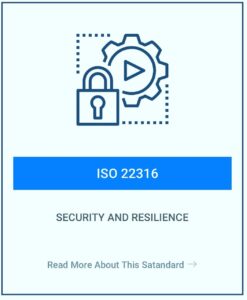BUSINESS SECURITY AND RESILIENCE

WHAT IS SECURITY AND RESILIENCE
Organizational resilience is an organization's ability to absorb and adapt in a changing environment in order to deliver on its objectives and survive and prosper. More resilient businesses can foresee and respond to dangers and opportunities that arise as a result of abrupt or gradual changes in their internal and external environments. Increasing resilience may be a strategic corporate aim, and it is the result of solid business practices and effective risk management. The resilience of an organization is influenced by a unique interaction and combination of strategic and operational factors. There is no absolute metric or clear aim; organizations can only be more or less resilient.
Commitment to enhanced organizational resilience contributes to:
-An improved ability to anticipate and address risks and vulnerabilities;
-Increased coordination and integration of management disciplines to improve coherence and performance;
-A greater understanding of interested parties and dependencies that support strategic goals, and objectives.
RESILIENCE PRINCIPALS
The principles serve as the foundation for developing, implementing, and evaluating a framework and strategy to improve organizational resilience.
An organization’s resilience:
a) is enhanced when behavior is aligned with a shared vision and purpose;
b) relies upon an up-to-date understanding of an organization’s context;
c) relies upon an ability to absorb, adapt and effectively respond to change;
d) relies upon good governance and management;
e) is supported by a diversity of skills, leadership, knowledge and experience;
f) is enhanced by coordination across management disciplines and contributions from technical and scientific areas of expertise;
g) relies upon effectively managing risk.
WHAT IS THE MANAGEMENT DISCIPLINES
Management disciplines that can support organizational resilience are:
Asset management, business continuity management, crisis management, cyber security management; communications management; emergency management; environmental management; facilities management; financial control; fraud control; governance; health and safety management; human resources management; information security management; — information, communications and technology; physical security management; quality management; risk management; — supply chain management; strategic planning.

